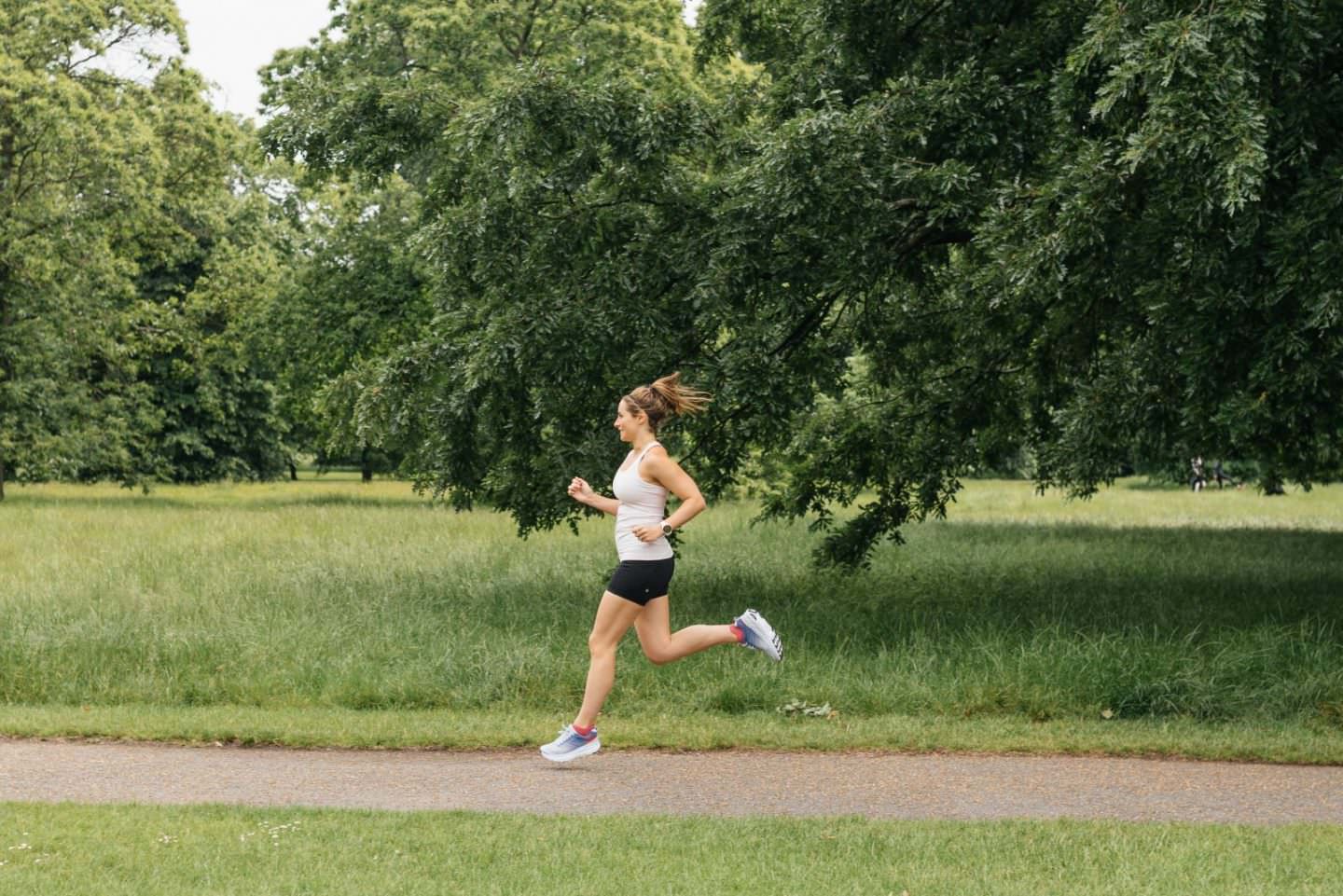For my first marathon I followed Hal Higdon’s Novice Supreme Training Plan. It was easy to follow, didn’t include any ‘workouts’ and the primary goal was to get me to the end of the 26.2 miles.
My second marathon was the NYC Marathon and I had just 10 weeks to prepare for it. And on this occasion I sought the advice and coaching of Gia, a NYC coach who knew the marathon course and helped me prepare for the challenges of those hills. It was the first time I’d included any kind of speed workout in my training and it paid off! I ran a 45+ minute PB!
From then I was convinced that handing over my training to someone more knowledgeable than me was key not only to improvements, but in keeping me accountable.
I’ve worked with a couple of different running coaches. All with slightly different styles of working and who brought different workouts/mileage/ideas to the table. Having someone else believe in me on race day has been just as invaluable as each individual workout that has helped me get to the race start line.
You can read my Pros and Cons of working with an Online Running Coach here.
Is it worth hiring a running coach?
Personally, yes.
You don’t have to be a professional runner to work with a coach in the same way you don’t have to be a professional athlete to work with a personal trainer.
If you have big goals you want to achieve, are finding yourself struggling to see improvements or would find it helpful to have someone to be accountable to… I would recommend looking into coaching if that’s something you can afford.
You do not have to be a certain speed or have a certain goal to start working with a coach.
When I first worked with Gia, I just wanted to finish the New York City Marathon. (I had run the London Marathon the year before in 4.54.) I didn’t have a time goal to begin with. But it was something we worked on together during training.
If you’ve dealt with injuries in the past and are coming back to running, or are trying to prevent injuries from reoccurring (aren’t we all!) then working with a coach to manage your build up, as well as helping with the strength, warm up and cool down component can be very helpful.
Many running coaches will talk you through form, cadence, stride, pre and post run stretches plus cross-training which can be invaluable for whatever stage of your running journey you’re at.
However in my opinion, the biggest benefit is from the personalisation of training plans to suit you. A generic online training plan might include 6 runs per week when you can only manage 3. Or it might top out at 60 miles per week when that high mileage causes you injuries. The idea behind working with a coach is to make an individualised plan to suit your needs. And for it to be altered and developed with you. So if you’re having a bad week at work, or your kids are sick, or you feel a niggle…the plan gets changed to work with your schedule/health. You don’t have to be a slave to the training plan. Or feel guilty if you skip a run because you’re simply exhausted.
What if you don’t have a fixed goal?
No problem, your goal might just be to feel more confident running. Or to hit a weekly mileage target, or just to enjoy your daily runs. Whatever your target is, you can chat it through with a coach to create the perfect plan for you. Whilst my BQ is my fixed goal (to run a sub 3.30 marathon), for once I don’t actually have a race on the calendar. I am kind of going back to basics with my training and working with a coach is ensuring that I do this the sensible way to gain fitness and strength.
What can you expect from a running coach?
What you get from a running coach varies between coaches (and sometimes the packages that they offer). Typically you’ll have an on-boarding call with your coach to discuss your goals, runs per week, lifestyle/work, and your current fitness levels/PBs. Then they’ll usually use an app such as Training Peaks or Vdot to schedule in your weekly runs, either in miles/KM or time based with prescribed effort levels/paces. The coaches I have worked with set workouts week by week. Whereas some others set them monthly. These plans will usually build up to a goal race. Whether that’s a 5K, 10K, half or full marathon (or beyond!). Some coaches will also have the option to add strength workouts to your running plans.
Communication between coach and athlete is key.
Depending on your individual coach, you’ll be able to message, text or call them to feedback on your workouts and have workouts adapted if needed. You’ll need to check with each coach to see how responsive they are. And how often you’re able to check in.
Most coaches will also help develop race day plans, down to pacing and nutrition. I spoke to Ash for about an hour before the Edinburgh marathon to discuss my race strategy, hydration and fueling mile by mile. She knew the course better than I did. I was so grateful for her knowledge and confidence in me! And although my race didn’t go quite to plan, I still ran a 6 minute PB. And had Ash calling me within 30 mins of finishing to congratulate me (and tell me what the wind gust strengths were to make me feel better!).
How much does a Running Coach Cost?
Cost seemed to be the most popular question on Instagram when talking about run coaching. And the truth is, cost varies a lot between running coaches. Sometimes this is based on experience and knowledge, or input (ie getting strength workouts/number of contacts). However, this isn’t always the case.
The ballpark figure seems to be around $100/£75 a month. However, there are coaches charging far more than this and those charging a lot less than this. It’s worth noting that a lot of running clubs in the UK that have running coaches that work as part of the club that often help with training plans as part of club fees or for much reduced rates.
To get more of an idea I’ve looked at the costs at some running coaches that I’ve worked with or had friends work with…
- Running with Us £100 per month
- Lift Run Perform $139 per month with 12 month contract, $159 with 6 month contract
- Ashley Davis has plans starting at $100 per month
- Laura Fountain £65 per month
- Purdue Performance £99 per month
- Hawkins Running with Callum Hawkins £15 per week
- Amanda Brooks at Run to the Finish 1:1 coaching starts at $200 per month
- Relentless Runners start at $99 per month for 12 months, $149 month by month
- McKirdy Trained $119 per month for 12 months, $139 per month for 6 months
Some coaches also offer customised training plans that are less pricey than 1:1 coaching but offer a more tailored approach to your training.
How to find a running coach?
I would say word of mouth and recommendations are the best way to find a running coach! Speak to friends who work with coaches. Or people that you follow on social media. You are looking for someone with coaching qualifications, not just a fast runner! In the UK the most common seems to be the UK Athletics and England Athletics. Whilst the US you can look out for USATF and RRCA qualifications. If in doubt, just ask!
For me finding someone that I can talk to about other things going on in my life that might affect my running is key. Someone that will understand life stresses, whilst helping me achieve my best. Ash is eternally optimistic which I love about her. Always down for fun running and believes in me often more than I believe in myself. I would never have thought I could run a 1.40 in Phoenix last year if she hadn’t said that was the time we were shooting for.
A key point in finding a coach for me was to find someone that would let me race when I wanted. I’m not talking about pushing it in every race. But taking part, running with friends and just having fun with running. If you want to get to know a coach, ask if you can schedule a call or speak to athletes they coach currently to get an idea if you’ll be a good fit with one another!
Do you currently work with a coach? Or have you considered working with a run coach before?



Thanks for another great article. Do you have any marathon or half marathon training apps that you could recommend? Thanks, Cara
I know a lot of people like the Hal Higdon, Asics and RunKeeper app training plans!
Do you have a general framework you use to determine how much strength training, running, and biking on the Peleton you do a week? I want to get back into long distance running, but still want to do the Peleton bike twice a week. I haven’t seen any good programs out there that mix them and have a strength component.
I’m afraid I don’t – my coach sets up cross training days and I often use the Peloton for recovery rides to shake out my legs!